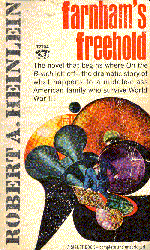|
Farnham's Freehold
Copyright 1964 by
I first read this in 1968 and most recently on the 20th December 2002 The atomic war that seemed so imminent in the fifties and sixties of the 20th century has at last erupted. The evil communists in the USSR have attacked God-fearing America with nuclear bombs. Luckily for the Farnham family, the foresighted Hubert Farnham has prepared an impressive bomb-shelter and his family and friends are lucky to escape into the bolthole moments before the big one hits. They survive this bomb and the ones that follow. They're living under very difficult conditions on bottled oxygen in a severely damaged shelter. After lasting as long as they can inside the shelter they struggle out expecting to encounter a wasteland of radioactive destruction around them. But that's not what they find. They emerge into an unspoilt wilderness. There's no trace of a nuclear holocaust, no ruins, no buildings at all, no people. There's no sign that anybody has ever lived there. Still Hubert is the archetype of the Heinlein hero, a tough liberal, a free-thinker, an intelligent and educated man who knows what has to be done and will go and do it. He's saved his family from nuclear destruction, he'll do his utmost to protect and preserve them through all that follows. What follows is truly surprising. Well it was surprising, exciting, horrifying and very stimulating to me when I read it as a bratlet a remarkably long time ago. It's still pretty darn exciting this time around. Our Mr Heinlein is at his controversial best hitting us concurrently from multiple angles. Race relations, sexual relations (polygamy, adultery and incest to name but a few of the variations mentioned), drugs, slavery and cannibalism. And of course he makes a tremendously exciting novel, even though it's now very dated. Apart from being a classic SF novel, it also presents a very clear picture of America's preconceptions and prejudices forty years ago. It's astonishing to think that intelligent people, not just survivalists, did indeed build fallout shelters. It's more astonishing to see the racial prejudice, almost embarrassing to read Heinlein's attacks on racism, having to state what is so obvious to us nowadays (although Heinlein was writing before the '64 Civil Rights act). It's unbearably painful realizing that even today, not only in America but in most countries, racism remains a terrible problem. Just for the record, in my view this is a strongly anti-racist novel. Heinlein, writing in the constraints of the American early '60s culture, believes there is no difference between people due to their colour, only due to their cultural and educational background. Is it sexist? Well, Heinlein clearly believes there are differences between male and female, but certainly not in the area of intelligence. The points Heinlein makes are valid: education and culture mold personalities and an imbalance of power corrupts both the master and the servant. By the way, apologies for the appalling state of this paperback's cover. I picked up this used edition in Good Day Books. My own edition is (i) inaccessible and (ii) probably in far worse condition. Loaded on the 27th December 2002.
|
|





